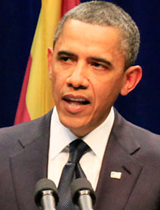WASHINGTON — Governors who reject the Medicaid expansion allowed under the Affordable Care Act could wind up in a politically awkward position on immigration: A quirk in the law means some U.S. citizens would not be covered, while legal immigrants in the same state could still get it.
 President Barack Obama
President Barack ObamaIt’s an unintended consequence of how last year’s Supreme Court decision changed the Medicaid provisions of President Barack Obama’s health care law.
The law expanded the federal-state program for low-income and disabled people. The Supreme Court made the Medicaid expansion optional for states, which complicated things.
Arizona officials called attention to the problem last week, when Republican Gov. Jan Brewer opted to accept the Medicaid expansion. Brewer had been a leading opponent of the law, and her decision got widespread attention. State budget documents cited the immigration glitch as one of her reasons.
“If Arizona does not expand, for poor Arizonans below (the federal poverty line), only legal immigrants, but not citizens, would be eligible for subsidies,” the documents said.
That’s because immigrants would be eligible for government-subsidized private insurance, while low-income citizens would not. The Obama administration confirmed Arizona’s interpretation.
 Gov. Jan Brewer.
Gov. Jan Brewer.The gist of what Brewer was saying is that “by rejecting the expansion, you are essentially rewarding the immigrant population at the expense of full citizens,” said Matt Salo, executive director of the National Association of Medicaid Directors, a nonpartisan group that represents the states in Washington.
“The political optics of that could be crushing,” he added.
It could take some explaining for Texas Gov. Rick Perry, steadfastly opposed to what foes dismiss as “Obamacare,” and for Florida Gov. Rick Scott, who is reassessing his position. Both states have large numbers of uninsured citizens and legal immigrants.
“I think politicians will be under a lot of pressure not to create these sorts of inequities,” said Jennifer Ng’andu, a health policy expert with the National Council of La Raza, one of the major Latino advocacy groups. Her group supports the health care law and is urging every state to accept the Medicaid expansion.
The quirk in the Affordable Care Act was not planned. It came about on the twisting route that laws follow from Congress to the president’s desk and to the courts.
To be sure, no one is talking about the government buying health insurance for illegal immigrants. That’s not allowed under Medicaid or Obama’s law. Instead, the issue here is between U.S. citizens and legal immigrants, those who are lawfully present in the country.
Here’s the convoluted background:
Starting Jan. 1, 2014, the health care law will offer health insurance to millions of people now uninsured. Middle-class uninsured people will be able to get taxpayer-subsidized private policies through new markets called exchanges. Low-income uninsured people will be steered to Medicaid, a government program jointly funded by Washington and the states.
Under previous laws, legal immigrants have to wait five years to qualify for Medicaid. Ng’andu said Hispanic advocacy groups wanted to lift that restriction during the 2009 congressional health care debate, but couldn’t get political support. The Medicaid waiting period remained in place, but a compromise was reached that would allow low-income legal immigrants to get subsidized private coverage in the new health insurance exchanges.
The health care law expanded Medicaid to cover millions of low-income adults who are ineligible under current rules. As written, the law assumed that every state would accept the Medicaid expansion, with Washington paying for most of it. So the law stipulated that people below the federal poverty line — $11, 170 for a single person, $23,050 for a family of four— could not get subsidies for private coverage in the exchanges. Medicaid was to be their only option.
Legal immigrants here for less than five years remained an exception.
Along came the Supreme Court. It upheld Obama’s law, but ruled that states were free to accept or reject the Medicaid expansion. The court did not touch the issue of coverage for legal immigrants in the health insurance exchanges. That provision remained in place.
And that’s how the immigration glitch came to be. Poor people in a state that turns down Obama’s Medicaid expansion can only get government subsidized coverage if they are legal immigrants. U.S. citizens are out of luck.
So far 11 states have said they’re not interested in the Medicaid expansion. Meanwhile, while 17 states and Washington, DC, say they are taking it. The rest are weighing their options. The immigration glitch is now one of those considerations.

By submitting your comments, you hereby give AZPM the right to post your comments and potentially use them in any other form of media operated by this institution.